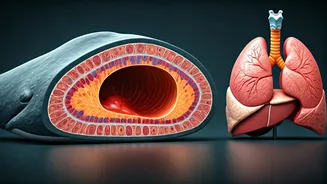Whales' Cancer Resistance
Whales, with their impressive size and longevity, are expected to be highly susceptible to cancer. Ironically, this isn't the case. Their bodies have evolved
remarkable mechanisms to combat this disease. Cetaceans, the scientific order that includes whales, have demonstrated a significantly lower rate of cancer compared to what's predicted based on their size and lifespan. This surprising resistance has sparked intense interest among researchers who see a potential goldmine of information about cancer's complexities and possible solutions. This naturally occurring phenomenon presents a unique opportunity for understanding the disease and developing novel therapeutic strategies.
Comparative Biology Insights
The field of comparative biology plays a vital role in understanding the whale-cancer connection. By studying the biological differences between whales and humans, researchers can identify the specific genes, proteins, and cellular processes responsible for whales' cancer resistance. This involves comparing the genetic makeup, physiological processes, and environmental factors impacting both species. Examining whale tissues and cells allows scientists to observe how these magnificent creatures naturally prevent or control cancer development. This comparative approach not only allows for a better understanding of cancer mechanisms but also provides potential clues for enhancing human health and longevity. The insights gained from such studies are invaluable.
Whale Genes & Cancer
One key area of research focuses on whale genes. Scientists are investigating the specific genes within whales that could be responsible for their cancer resistance. These genes might encode proteins that effectively repair DNA damage, trigger the self-destruction of cancerous cells, or fortify the immune system to fight against tumors. Scientists have already identified some potential cancer-fighting genes in whales that are different from those found in humans. This research could revolutionize cancer treatment if these genes can be adapted or utilized in human medicine. The goal is to uncover the specific mechanisms and pathways used by whales to prevent cancer.
Unique Whale Adaptations
Whales possess several unique adaptations that may contribute to their cancer resistance. For example, they have a higher number of tumor suppressor genes compared to humans. These genes help regulate cell growth and prevent the formation of tumors. Additionally, whales' immune systems are highly efficient at detecting and destroying cancerous cells. Their cells are also adept at DNA repair. Further investigation is aimed at understanding the specific cellular processes and molecular pathways involved. The findings could lead to new drugs and therapies that are inspired by these natural defenses. Learning about whale adaptations provides valuable insights into how these magnificent creatures are able to thrive in the face of cancer.
Potential for Human Benefit
The research into whale cancer resistance has the potential to yield significant benefits for human health. Discoveries made through studying whales could lead to the development of new cancer treatments, improved diagnostic tools, and better preventative strategies. If researchers can identify and understand the mechanisms used by whales to resist cancer, they could potentially replicate those mechanisms in humans. These breakthroughs could involve gene therapy, immunotherapy, or new pharmaceuticals. The findings could potentially allow humans to combat cancer more effectively. The study of whales and cancer underscores the interconnectedness of all life and emphasizes the importance of understanding the natural world to benefit human society.




















